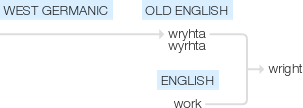Wright
Old English wryhta, wyrhta, of West Germanic origin; related to work.
wiktionary
From Middle English wrighte, wriȝte, wruhte, wurhte, from Old English wyrhta(“worker; wright; workman; artificer; laborer; craftsman”), from Proto-West Germanic *wurhtijō (as in *wurkijan), from Proto-Indo-European *werǵ-(“to work”) (English work). Cognate with wrought, dated Dutch wrecht.
wright (third-person singular simple present wrights, present participle wrighting, simple past and past participle wrighted)
etymonline
wright (n.)
Old English wryhta, wrihta (Northumbrian wyrchta, Kentish werhta) "worker," variant of earlier wyhrta "maker," from wyrcan "to work" (see work (v.)). Now usually in combinations (wheelwright, playwright, etc.) or as a surname. A common West Germanic word; cognate with Old Saxon wurhito, Old Frisian wrichta, Old High German wurhto.
The metathesis of -r- and a vowel in words from Old English is also seen in thrash, thresh, third, thirty, bird, wrought, and nostril.
